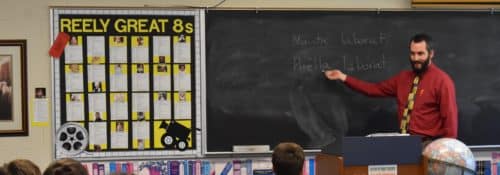
The Timeliness of Learning Latin
By Katarzyna Ignatik
Because Latin is no longer spoken, it’s not widely studied as part of a primary or secondary school education. Yet, it’s a significant part of many classical schools’ curricula, including the Barney Charter Schools and Hillsdale Academy.
JohnMark Beazley, who joined Hillsdale Academy’s faculty this year, believes that learning Latin has benefits for the modern student. He teaches fourth- through eighth-grade Latin and an advanced twelfth-grade Latin class at the Academy.
Teaching Latin to younger students, Beazley said, allows children to become more familiar with the structure of language, and it exercises their developing minds. “Young minds have an amazing ability to memorize,” Beazley said. “When students memorize vocabulary and paradigms at a young age, those words have time to set firmly in their minds and become part of the working memory.”
Putting the work in on memorization and grammar also forms students’ study habits and work ethic, Beazley claimed. “I routinely tell my students that the only thing they need to succeed in Latin is hard work,” Beazley said. Every Latin student, no matter how intuitively he understands language, needs to be diligent, especially when pushing through all the foreign structures of a new language. The rigorous study patterns learned with Latin carry over to other disciplines.
The longer one studies Latin, the more rewards he will gain from it. Beazley himself began learning Latin so he could read the original Latin texts of early Christian writers. “As adults, we should read Latin texts as literature and wrestle with both the Latin and how the ideas are expressed in Latin,” Beazley said.
As for the practical aspect of teaching Latin, Beazley said that he uses the Socratic method in the classroom to lead students to come to the right answers themselves. He uses some spoken Latin in the classroom, and he has class recitations of paradigms at the beginning of every class. Some more age-appropriate activities, such as board games for younger students, can help with memorization and the tasks that each class has to learn.
In brief, Beazley said that Latin “unlocks a wealth of Western literature and learning.” He adds, “Learning Latin…is an excellent tool to develop the virtues of patience, perseverance, diligence, and humility.” For centuries, Latin has developed character in the young. By learning Latin early on, today’s students can take part in that tradition, and become people of virtue.